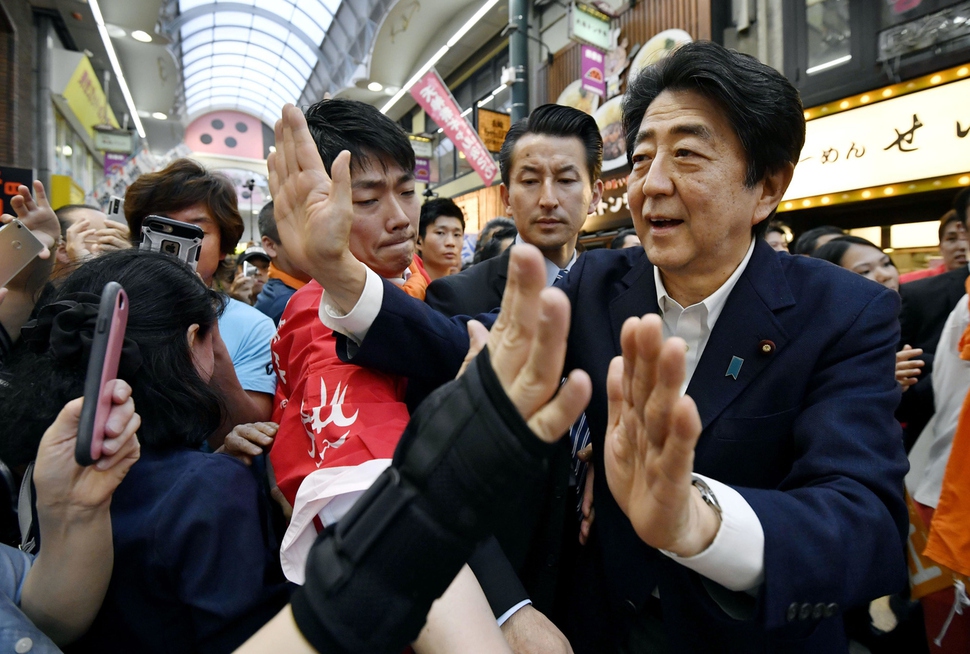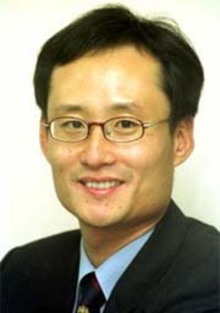 |
|
Prime Minister Shinzo Abe during a campaign rally in Osaka on July 7. (Yonhap News)
|
The right wing’s contempt for Trump’s attitude to N. Korea has made them latch onto Abe
Prior to US President Donald Trump’s visit to South Korea on June 29, US Ambassador to South Korea Harry Harris paid a visit to Min Gab-ryong, commissioner general of the Korean National Police Agency (KNPA). He went for a special courtesy call to ask for Min to “do a good job.” There was a story behind this: in November 2017, while Trump was on his first visit to South Korea after Moon Jae-in took office as president, his delegation suffered an unexpected mishap. While they were returning to their Hyatt Hotel lodgings after a dinner at the Blue House, demonstrators gathered in front of the Sejong Center in downtown Seoul had hurled paper cups and water bottles at the Trump delegation’s vehicle caravan. The group immediately changed course and returned to their accommodations, traveling back along the road opposite Sejong Road. The “incident” had both the US Embassy and South Korean police feeling relieved to have dodged a bullet. The Seoul Metropolitan Government’s decision not long ago to remove illegal Our Republican Party tents from Gwanghwamun Square also appears to have been connected with Trump’s visit. Two years ago, with tensions on the Korean Peninsula at a fever pitch, the demonstrators had been progressives voicing their opposition to war and to Trump. It may seem reasonable, then, to be concerned about more anti-Trump demonstrations, this time by far-right conservatives. Conservatives felt profoundly betrayed at the surprise event when Trump – the one they had expected to give North Korea a verbal lashing – had instead set foot on North Korean soil at Panmunjom with leader Kim Jong-un. It’s a mood exemplified in remarks by conservative commentator Jeong Gyu-jae, who insisted that South Korean conservatives “now need to quickly chart a new course that does not rely on Trump or the US.” We still see the stars and stripes appearing alongside South Korean flags at the “Taegeukgi rallies” that have pushed through central Seoul every weekend – but now some of those figures are openly questioning why they are waving American flags. South Korea’s conservatives have a deeply rooted pro-US slant, and if they are actually looking for a “new course that does not rely on the US,” that would be a welcome development. But from the looks of things recently, it appears that the reliance on the US has merely been replaced with reliance on Japan. Things really are going quite far when they start insisting that the Moon Jae-in administration is solely to blame for the breakdown in South Korea-Japan relations, or even arguing that his predecessors in the Park Geun-hye administration did the right thing in violating the separation of powers to block court rulings ordering compensation for forced labor conscription. South Korea’s conservatives have been dependent on outside powers since the start; even so, the latest turn has been a rather strange one. The typical approach of South Korean conservative administration has been to denounce progressives for their “outmoded nationalism,” while routinely making political use of the anti-Japan sentiments in issues concerning Tokyo. Even as he neutralized the Special Investigation Committee of Antinational Activists after Korea’s liberation, President Rhee Syng-man – considered the “founding father” by South Korean conservatives – insisted that he could never form diplomatic ties with Japan. President Park Chung-hee, the main player in the eventual normalization of South Korea-Japan relations, sustained his own administration in the 1970s by encouraging and exploiting large-scale government-led anti-Japan demonstrations following the abduction of Kim Dae-jung, who later became president, and the assassination of first lady Yuk Young-soo. Conservative parties and press supported past presidents who express anti-Japan views This did not end all those decades ago. The current chill in South Korea-Japan relations began in 2012 when then President Lee Myung-bak visited Dokdo. After the stealthy pursuit of a South Korea-Japan General Security of Military Information Agreement went south, Lee suddenly launched into an offensive against Japan and went to visit Dokdo – something no president before him had ever done. It’s easy to surmise that Lee, who was then facing a political crisis owing among other things to corruption by his relatives, had decided to play the “Japan card” as a way to turn public opinion in his favor. He received full-throated support at the time from the conservative press and the Saenuri Party (the predecessor of today’s Liberty Korea Party). For its front-page headline, the Dong-A Ilbo used Lee quote describing Dokdo as “true Korean territory that we must give our lives to protect.” It’s a different story now. While the conflict between South Korea and Japan spirals toward disaster, conservatives don’t seem much interested in criticizing the Shinzo Abe administration. They’re far more focused on picking apart the Moon administration’s diplomatic missteps. To be sure, there are real questions as to whether Minister of Foreign Affairs Kang Kyung-wha and the rest of the foreign affairs and national security lineup have responded appropriately to South Korea-Japan issues over the past several months. But this hardly offers a comprehensible rationale for Abe’s actions, which are 10 times more reckless than what Lee Myung-bak attempted. S. Korean conservatives and Abe both oppose Korean reunification
 |
|
Park Chan-su, editorial writer
|







